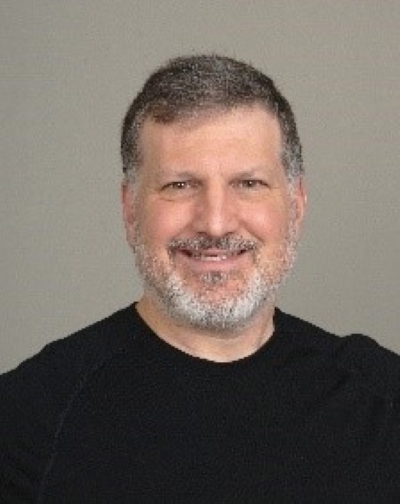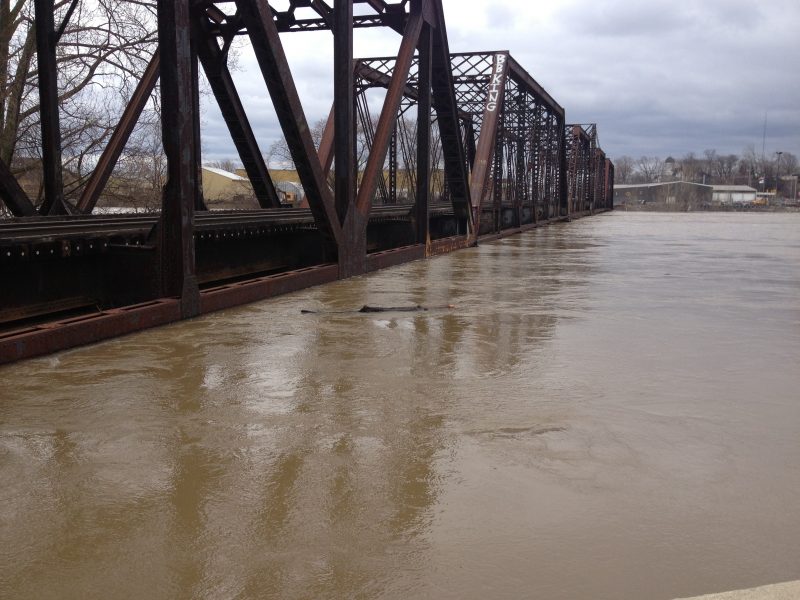Five years before the 2018 Houghton Father’s Day Flood presented civil engineers with infrastructure challenges, there was the Grand Rapids Flood Event. This flood, which lasted from April 12 to April 25 2013, affected multiple areas in the city. At that time, the Midwest had been receiving a deluge of rain, with Grand Rapids getting 3.5 inches (89mm) of the wet stuff between April 8 and 15. And upriver, the Comstock Park community received 5.04 inches (128mm). With the latter rainfall, the Comstock Park floodwaters moved from minor to moderate, resulting in the river rising to 13.3 feet (4.1m) by April 13.
Rain continued to fall throughout the city, but on April 19, the tipping point was the 9.1 inches that fell in Grand Rapids, breaking the 109-year record from the flood of 1904-1905. Then, things rapidly grew from bad to worse. On April 21, the Grand River crested at 17.8 feet (5.8 feet above flood level) in Comstock whereas it rose to 21.85 feet (3.85 feet above flood level) in Grand Rapids.
1700 residents were evacuated (1000 from the Plaza Towers alone). Roads were closed. Railroads were impassable. The water in the city core was so high, in fact, that people reported fish swimming by their office floor windows. 429 million gallons of wastewater ended up seeping into the Grand River.
After the flood, the investigations began, not only to determine what went wrong, but also to prepare for future disastrous events.
Experts analyzed the events and identified the city’s risk of flood-prone areas using Geographical Information System modeling. They collected the physical data about the flood protection system assets for contingency planning and resiliency analysis against intense storm events.

Introducing Mark Declercq

One of the leading engineers on the front lines was Grand Rapids City Engineer and Civil Asset Management expert, Mark Declercq, PE and MTU Alum (Bachelor’s and Master’s of Structural Engineering, ’88, ’90).
As City Engineer for Grand Rapids, Declercq was responsible for the enterprise asset management program, capital project delivery, and capital maintenance program for the care of public assets.
These assets included the public transportation systems; water distribution and sanitary collection systems; storm water conveyance systems, pumping stations, retention structures and clean water plants; energy audits on public buildings; and solar array systems design and installation. In other words, he played a major role in Grand Rapids infrastructure.
After the flood, Declercq stepped in to co-lead the Grand River Corridor Strategic and Conceptual Planning for the potential river restoration project and riverbank development. The project, indeed, was a success: the Grand River watershed, low-head dam restoration, and flood protection system were all re-certified by FEMA. This recertification was a crucial part of the update and digitalization of nationwide flood insurance maps.
And this restoration project smartly kept the heart of the city in mind, too. For instance, the impressive amphitheater project in downtown Grand Rapids is a result of that strategic plan. In the 2013 Grand Rapids Flood Event, then, Asset Management was crucial for building resiliency, sustainability, and business continuity. (Fun fact, former MTU professor Dr. Henry Sanford acted watershed hydrology expert for the City of Grand Rapids.)
Sharing His Civil Asset Management Expertise With MTU
Declercq will bring his experience as a City Engineer, his expertise in Asset Management Planning, and his over 33 years in the private and public sectors to Michigan Technological University. In Fall 2023, he is teaching a 3-credit, online Civil Asset Management professional development course for the Department of Civil, Environmental, and Geospatial Engineering.
Currently, he serves as president of Applied Asset Management Consultants, an entrepreneurial start-up that was launched in 2018.
And his skills and credentials don’t stop there.
Declercq not only holds certifications in Professional Asset Management, LEAN Management, and Emergency Management, but also has memberships in the Institute of Asset Management, the American Society of Civil Engineers, and the Michigan Society of Professional Engineers. Indeed, his resume is loaded with his accomplishments.
The Grand Rapids flood was one of Michigan’s worst natural disasters. It altered how we worked and lived in the downtown area. It served as a catalyst for a shift in the way we conceived land use and the deployment of resources in order to save our city and construct it in the future.

Building Connections to Tech
Declercq is no stranger to Michigan Tech either. Previously, he collaborated with Dr. Audra Morse to invite CEGE students and faculty to participate in the IAM Great Lakes Branch quarterly meetings. One goal: exposing students to best practices involved with real-world CEGE challenges. Another goal: introducing students to future employers, such as public municipalities, federal and state regulatory agencies, private sector companies, and engineering consultants.
In addition, at the November 2023 IAM Great Lakes meeting, the CEGE will present the Enbridge Line 5 Risk Assessment under the Straits of Mackinac. This presentation will showcase the work and ingenuity of the CEGE Dept and its students.
So it was only natural that Dr. Morse proposed an Adjunct Professor of Practice opportunity so that Declercq could share his expertise on asset management as it applies to civil infrastructure.
Managing Civil Assets
According to Declercq, all infrastructure has value to its organization, customers, and stakeholders. Thus, in civil engineering, Asset Management is the science and practice (coordinated activity) of managing infrastructure systems and civil assets to realize their value and to achieve the highest levels of services for communities. Asset Management, which is cross-functional, involves several disciplines, such as business management, finance, and risk.
The goal is optimizing the life cycle of the civil assets that shape our lives. Below is just a short list of civil assets.
- Transportation systems (roads, bridges, tunnels, and all assets within the public right-of-way)
- Long-span bridge systems (Mackinac Bridge)
- Potable Water distribution systems (watermain pipelines, groundwater pumping systems, buried and elevated tanks, and water treatment facilities)
- Wastewater collection systems (underground piping, clean water treatment facilities)
- Storm water conveyance systems
- River watersheds and dam structures
- Flood protection systems
- Landfill operations
- Natural assets like trail network system, national and state parks, museums
- Electrical/Natural Gas generation, transmission, and distribution systems
- Public-use facilities

Interviewing Mark Declercq
To let him speak, I asked Declercq a few questions about his course and the future of civil engineering.
Q. When is the course running? How is it delivered? What content does it cover?
A. The 14-week, for-credit course “Civil Asset Management” (CEE 5390) will first be available in Fall, 2023. It is delivered in a synchronous online format. That is, classes will run Tuesdays and Thursdays from 4:00-5:20 pm. Each class will consist of brief instructor-led lectures, followed by student engagement activities. There is also a weekly online laboratory session for applying concepts and working with real-life scenarios.
This course is suitable for all civil engineering students who want to broaden their skills. Civil Asset Management spans a diversity of disciplines including business, finance, risk, supply chain managers, construction managers, facility managers, resource managers, and operational and maintenance managers. CAM, in short, is necessary for the long-term design, maintenance, and sustainability of civil engineering infrastructure and facility asset types in the United States.
The course covers several topics fundamental to Civil Asset Management. Topics include asset data and risk assessment; environmental, social, and governance principles; six working capitals; overview of computerized maintenance systems; sustainability strategies; and funding mechanisms. Central to this course is a rich case study on the 2013 Grand Rapids flood event.
Students will acquire many valuable skills, such as evaluating asset value against cost, risk, and performance in managing the long-term care of civil engineering infrastructure. They will also apply the 10-steps to building an Asset Management Plan. Finally, they will use the A3 Lean Management tool for scenario and business case evaluation.
Q. Why is Civil Asset Management important to civil engineers? What organizations use it?
A. Civil Asset Management is an important and necessary technical and business skill set for today’s civil engineers. That is, civil engineers must learn to be strategic about developing recommendations and formulating decisions. They must be able to optimize the value of asset infrastructure.
This skill set has several societal benefits, too, such as enabling the affordability of and accessibility to basic infrastructure, such as water, wastewater, and multi-modal transportation options. It also equips engineers with the skills to develop strategic plans that incorporate resiliency and sustainability against climate change. And in these plans, engineers learn how to account for disruptors to business continuity.
Most importantly, Asset Management values Environmental, Social, and Governance (ESG) principles embraced by many international governments, as well as the United Nations Sustainability Development Goals. Also, traditional US civil engineering firms need those with Civil Asset Management expertise to develop plans and frameworks for organizations.
Although early in its journey in the United States, Civil Asset Management has been adopted by several Michigan organizations. These include the Michigan Department of Transportation; the Michigan office of Environment, Great Lakes, and Energy (E.G.L.E.); and the Michigan Chapters of the American Water Works Association (AWWA) and Water Environmental Association (MWEA). Asset Management has also been incorporated at the federal level. It is employed by the Department of Defense, the US Army Corps of Engineers, the Department of Interior for US Parks, and the Environmental Protection Agency (EPA).
Q. How does Civil Asset Management help civil engineers prepare for some of the challenges in their fields?
A. Critical thinking is a significant challenge in our civil engineering industry. Or to put it another way, strategy, planning, and the art of “big picture” thinking comprise an undervalued skill set in our industry. This skill set, though, is crucial to both Asset Management and Project Management.
Another challenge for civil engineers is understanding the concept of “value” from the viewpoint of the customer or end user. For example, consider water main breaks caused by freezing winter temperatures and an unreliable, aged distribution system. The risks are high if the geographical impacts are widespread and felt for a prolonged period of time. Hence, the “value” of the water system in this state is considered less than desirable, especially from users facing affordability challenges with their monthly water rates. Electric outages from recent storm damages throughout Michigan are another example.
Asset Management Planning, then, enables both the strategic thinking and long-term planning to develop scenarios based on data, science, and known risks that improve customer/user outcomes, such as affordable water rates and electrical reliability. Implementing Asset Management’s best practices and tools helps civil engineers do better for their communities and beyond.
Q. Where are those with Civil Asset Management expertise employed?
A. Those with Civil Asset Management experience often begin their careers in a variety of roles: young project engineers, data analysts, engineering technicians, product designers, and project managers. This expertise also opens up opportunities for moving up to positions, such as a CEO, COO, Vice President, or Director of assets and capital project delivery programs.
Additionally, those who have knowledge in managing civil assets might take on the roles of City Managers, City Engineers, Finance Officers, Risk Managers, County Administrative Managers, Water/Sewer/Storm Asset Managers, Public Works/Services Directors, Facility Managers, and other top management and C-, VP-level leadership positions. Furthermore, Civil Asset Management expertise signals an understanding of key business outcomes, a valuable attribute that private and public sectors seek in recruiting leadership talent.
Q. Is there anything else you’d like to add?
A. My life, both on and off the job has provided me with considerable real-life stories and examples that serve as valuable teaching and mentoring for students. For instance, I love the environment and protecting its value.
I have hiked all the Isle Royale trails, made over a dozen visits to the island. And I have thru-hiked the 2,200-mile Appalachian Trail in 2018 over a six-month period, thru-hiked the John Muir Trail in the California High Sierra Mountains in 2022, and hiked the Patagonia W-trek in spring 2023. Next, I plan to thru-hike the 2,600-mile Pacific Crest Trail in 2024.

at Baxter Peak.

These hiking experiences tell me that we must do more to advocate for and protect our environment, perhaps our most valuable civil asset.



